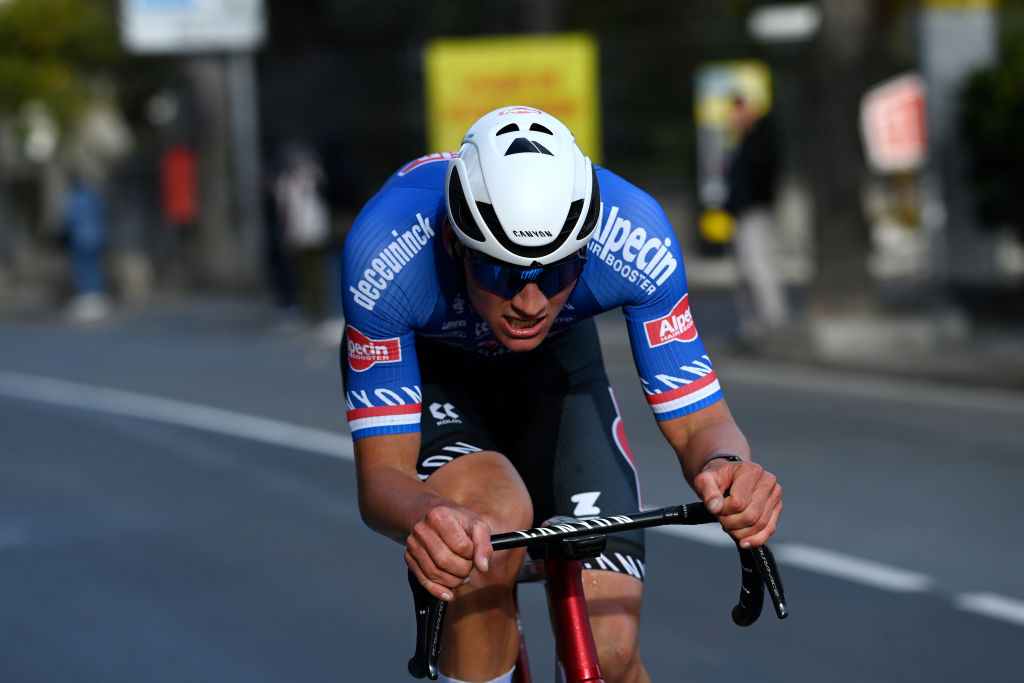
Yet again the finale of Milan-San Remo has set a very high bar for the other Monuments to follow, with the 2023 edition holding firm to its habit of delivering drama, tension and suspense.
Mathieu van der Poel, clinched his first-ever Primavera, and the third Monument victory of his career, allowing the Dutchman to carve a space in cycling’s history books as he emulated his grandfather’s win of more than half a century ago. The Alpecin-Deceuninck rider’s spectacular solo victory, however, left Tadej Pogačar (UAE Team Emirates) wondering what might have been after his widely predicted attack on the Poggio ended up being the launchpad for Van der Poel.
The Slovenian, of course, was far from the only rider wishing the race had played out a little differently. The high pace took the sprinters out of contention, and left the race for victory squarely in the hands of the Poggio break of Pogačar, Van der Poel, Filippo Ganna (Ineos Grenadiers) and Wout van Aert (Jumbo-Visma).
That was when the spotlight was emphatically taken by Van der Poel, but of course 294km of racing exposed plenty more than his formidable power on the final climb and seamless descending. Stephen Farrand, who was on the ground in Italy, takes a closer look at the main takeaways from the March 18 race.
Never change Milan-San Remo
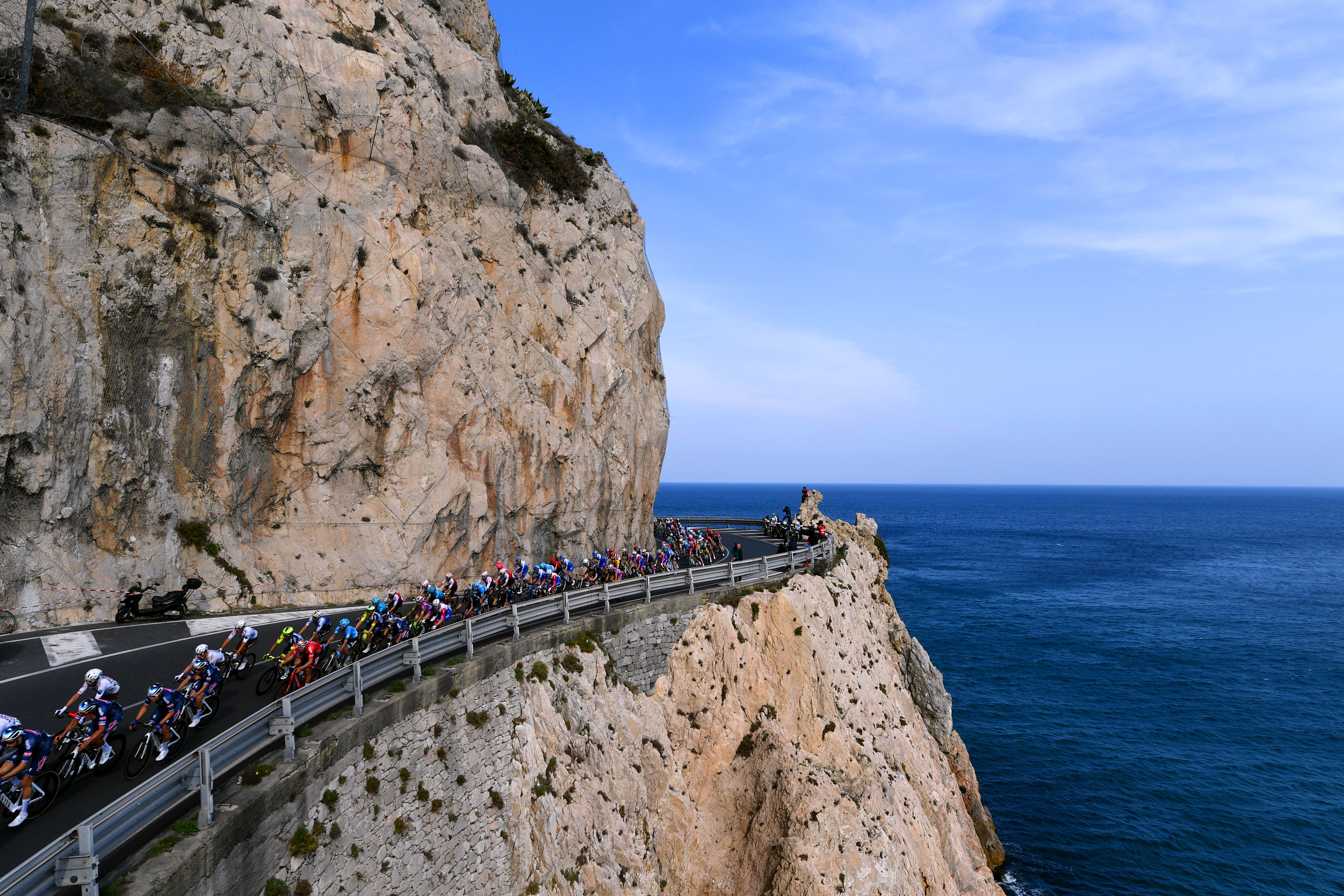
Milan-San Remo 2023 was yet another slow burner, a very gradual crescendo of increasing emotions and excitement. There were five hours and 250km of controlled, uneventful racing followed by a fraught final hour and an electrifying final 10 minutes over the Poggio.
La Classicissima is not a race made for television and there’s no easy way to understand its format. The one-way route to San Remo doesn’t include circuits to help sell VIP packages and the best rider might not even win on the Via Roma. But without the near 300km of race distance slowly eating into the peloton's legs and slowly but inevitably revealing their limitations, Milan-San Remo would just be like any other race.
The Milan-San Remo route has evolved over the years, with Cipressa and the Poggio both added when the sprinters began to dominate. There are also often calls for more climbs to be added to make more of a selection and inspire earlier action.
Though nothing makes a bike race more thrilling than an unpredictable outcome, a result that is balanced on a knife edge and open to a multitude of potential winners – but only one rider can ultimately triumph on the Via Roma.
We wouldn’t want it any other way. Never change Milan-San Remo.
Mathieu van der Poel’s magic numbers
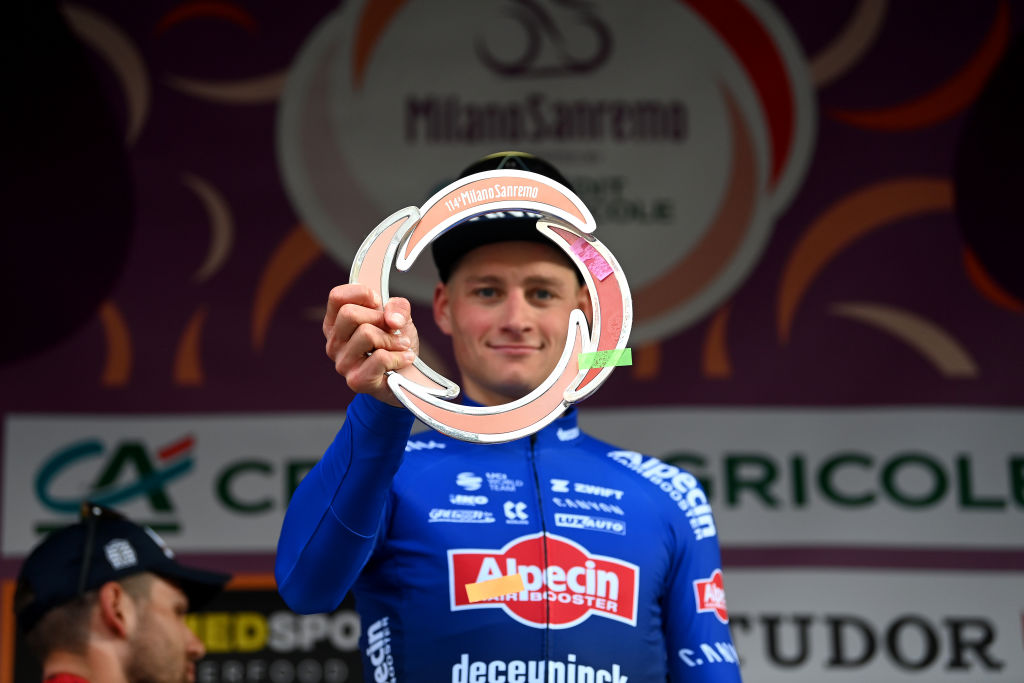
Mathieu van der Poel won Milan-San Remo as the best riders so often do: with a powerful solo attack over the top of the Poggio, a fearless dive down the 3.7km, 30-corner descent and then an unbeatable ride along the short segment of flat that leads to the finish line.
Hennie Kuiper was the last Dutchman to win – as it happened, in a similar style – 38 years ago, while 62 years ago Van der Poel’s grandfather Raymond Poulidor won Milan-San Remo alone, again on March 18. Destiny and history runs deep in the Van der Poel family and they are entwined in Milan-San Remo.
The black and white photo montage by Sprint Cycling of Van der Poel and Poulidor crossing the finish line 62 years apart, but yet together, was hugely symbolic.
Women’s 2024 Milan-San Remo could spark date shuffle
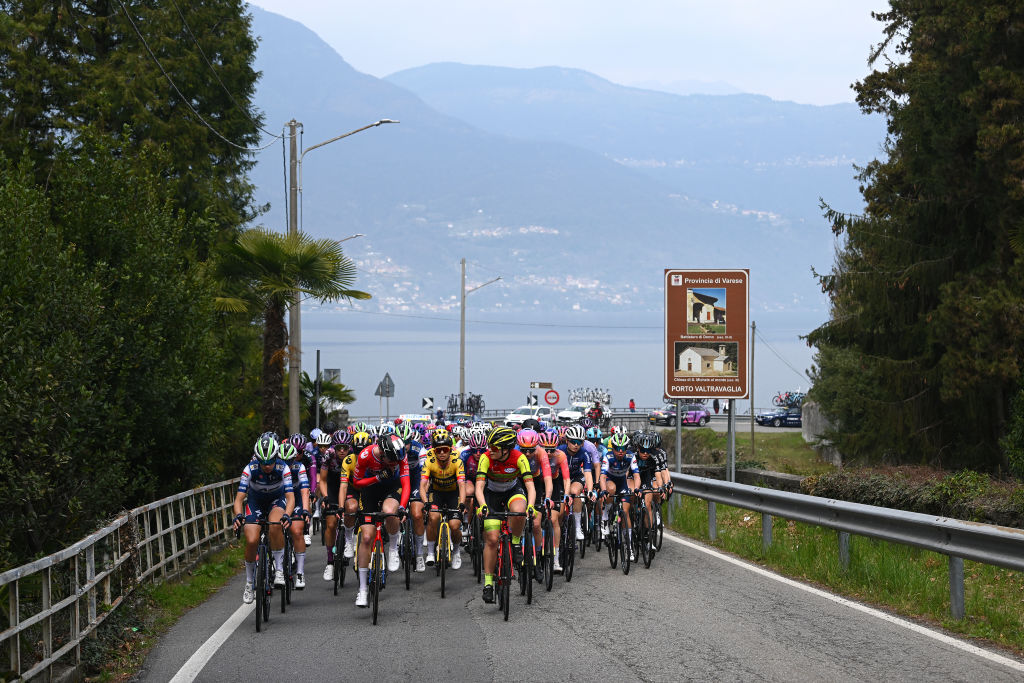
A women’s edition of Milan-San Remo is looking close, with RCS Sport CEO Paolo Bellino foreshadowing it's re-introduction for 2024. There was a women's version of the race called the Primavera Rosa held from 1999 to 2005 and its route followed the final 118 km of the men's race including the Cipressa and Poggio climbs.
It's the type of event that, if run long enough, could suit those who revel in tough conditions, like Annemiek Van Vleuten. The rider with a lengthy list of victories in the most prestigious races on the calendar may be set to retire before the new event takes place but that doesn't mean she isn't keenly interested in seeing a race debut that has the potential to take distances within the women's peloton into a new realm. The World Champion told Cyclingnews she would like the race to be 'crazy long' but isn't asking for an immediate leap to the 294km distance of the men's event, suggesting a start point of 200km.
However Bellino suggested the race will start in Arenzano, on the Liguarian coast east of Genoa, possibly with a total race distance of around 130km.
"We're working on it and hope to include it in next year's calendar. That's our goal," Bellino told Italian website BiciPro recently. "We imagine it'll be held on the same day [as the men's race] but on a different route, probably from Arenzano to San Remo. I think it'd be a great race."
The return of the women’s Milan-San Remo, regardless of its final shape, will likely spark a conflict in the women’s WorldTour calendar, as the long-running Trofeo Alfredo Binda is traditionally held on the day after the men’s event. However if the race, which started in 1974, was prompted to move there are not a lot of obvious gaps in the schedule around this time of year.
The March Women's WorldTour calendar for 2022 already has Women's WorldTour events across every weekend, starting with the women’s Strade Bianche also organised by RCS Sport. Even the mid-week slot after Trofeo Binda is taken, with Classic Brugge-De Panne Women and the heavily-populated schedule of one-day racing also continues through April.
From zero wins pre-Strade to headline success
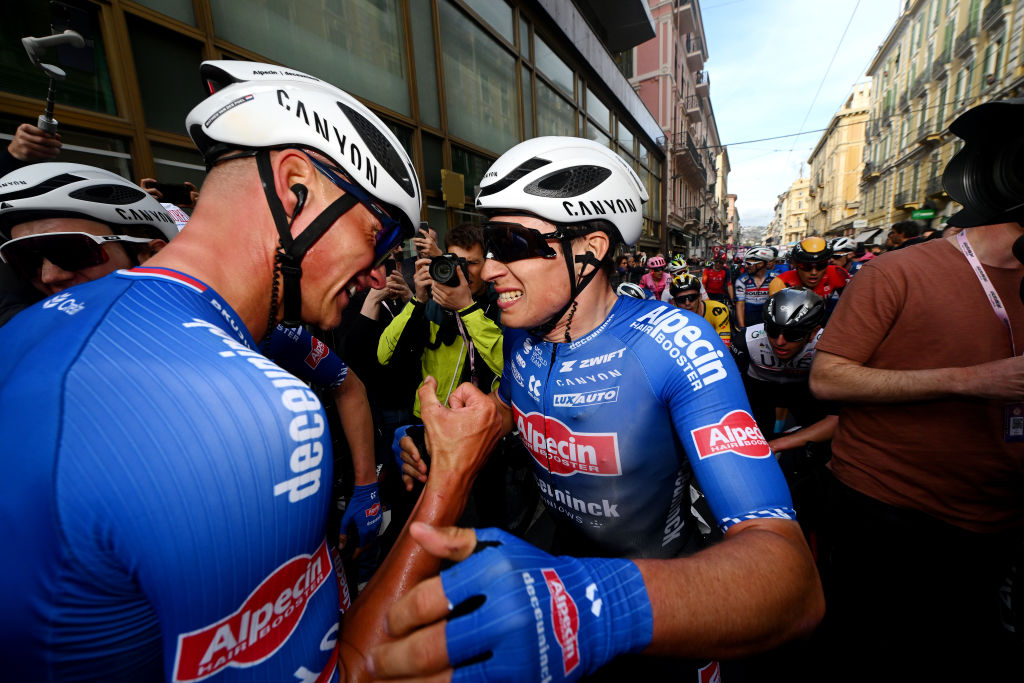
What a difference two weeks has made for Van der Poel and Alpecin-Deceuninck. When the Dutchman and his team began their Italian campaign at Strade Bianche on March 4, they were still looking for their first win of the season and Van der Poel was still on the hunt for his Classics form. Now they have won a Monument and stolen the spotlight from their rivals Soudal-QuickStep and Jumbo-Visma. It’s a remarkable turnaround.
Van der Poel had only done two weeks of training after winning the cyclocross world title and it showed at Strade Bianche. There were no aggressive attacks on the Tuscan gravel and only sour faces and silence in the team. He also struggled at Tirreno-Adriatico, failing to win a stage and even getting dropped on the two hilly days that suited him.
Two superb lead-outs from Van der Poel and two impressive sprint wins from Jasper Philipsen ended Alpecin-Deceuninck’s drought but the Classics were coming up quickly and the pressure was on.
Fortunately the suffering at Tirreno-Adriatico proved useful for Van der Poel and the extra days of recovery and recon of the Poggio before Milan-San Remo put a smile back on his face. He had found the right balance between form and his love of racing aggressively.
His teammates came good in the nick of time too, with Quinten Hermans, Gianni Vermeersch and Silvan Dillier playing key roles before the Poggio and new signing Søren Kragh Andersen at his side later after the key split. Then Van der Poel did the rest of what was needed to silence any critics.
“We don't really panic,” he insisted.
“The season was still pretty young and now the team has won the first Monument. We knew that our races still had to come, so we just needed to keep working and do our thing.”
Tadej Pogačar’s generosity proves costly again
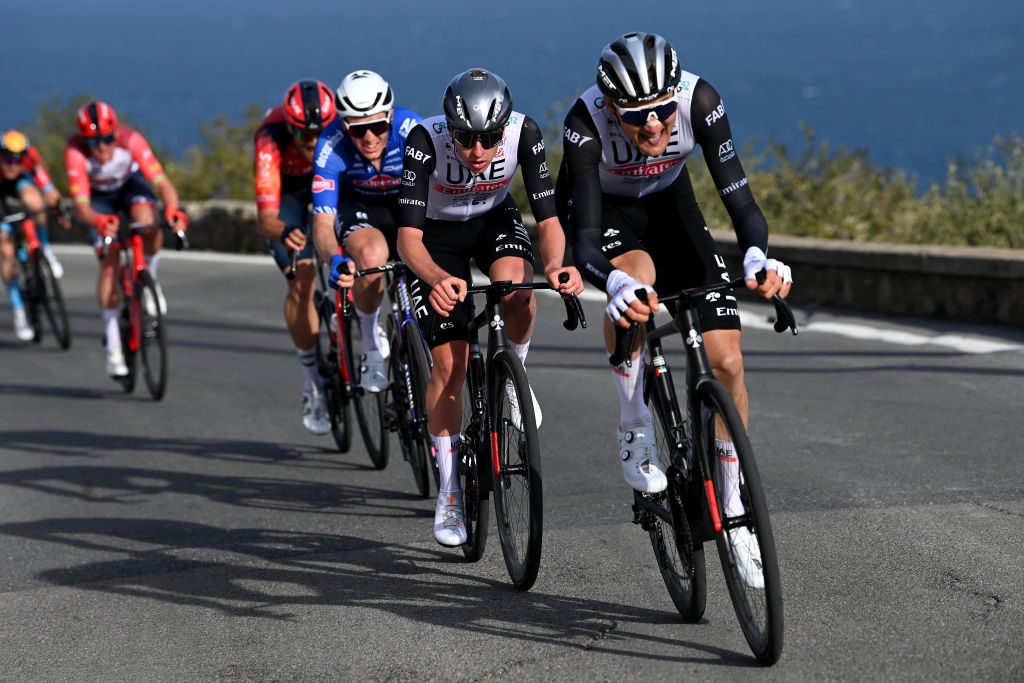
The looks between the UAE Team management at the team bus said it all. Tadej Pogačar had targeted Milan-San Remo for a second year, he made the most decisive attack on the Poggio but was overly generous with a long turn on the front, leaving him unable to respond to Van der Poel's searing attack and so spent he even finished off the podium.
“That’s Tadej, he’s generous,” team manager Mauro Gianetti told Cyclingnews.
“We did our plan, but we’re not alone in the race so respect and chapeau to Van der Poel."
“Tadej is disappointed because he likes to win, but he’s not angry. Despite the result, we know he’ll be in the race at Flanders, and whatever the result is there, it’s good for cycling if the guys race aggressively.”
Cavendish shows his Milan-San Remo pride
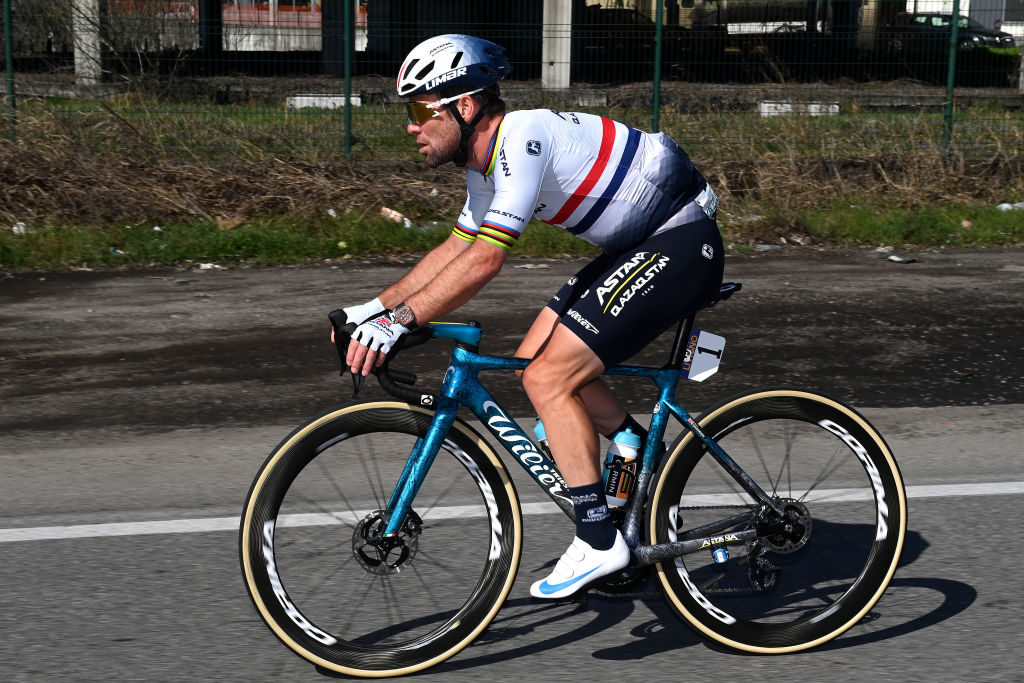
Mark Cavendish (Astana Qazaqstan) was one of the first sprinters to be dropped at Milan-San Remo, the high speed and eventual aggressive racing meaning all the fast men would not fight for victory this year.
Cavendish was distanced on the Capo Berta, earlier than ever before in his ten previous rides. In 2009, on his debut, he stayed up front on the Cipressa and the Poggio and then won the sprint to the line.
Before the start, Cavendish joked he is now the 'senior sprinter' of the peloton but his love and respect for Milan-San Remo still burns strong. He could have climbed off after being distanced on the capi or cut out the Poggio climb and ridden directly to the Astana team bus.
He did neither, opting to climb the Poggio and finish Milan-San Remo. He crossed the finish line 150th, 11:56 down on van der Poel, honouring the race and his own career.
No moto, no footage of Van der Poel’s attack
pic.twitter.com/J7M1rFpe5RMarch 18, 2023
Polemics about race motorbikes influencing the outcome of races, and especially Milan-San Remo, have existed for years. Yet this year the post-race discussions were all about their absence on the final part of the iconic climb and on the descent.
Back in the day, the first rider to attack on the Poggio could accelerate into the slipstream of a hoard of motorbikes and beefy photographers. A pool system of just one or two chosen photographers ended all that but the television motorbike offered a final hare to chase on the climb and the descent of the Poggio.
Last year's winner, Matej Mohoric, almost rode into the back of a motorbike on the descent of the Poggio, such was his speed.
This year the road was empty ahead of Mathieu van der Poel when he made his attack and on the descent as he dived to victory, apparently after an agreement was reached between the UCI, race organisers, the host broadcaster and photographers. The motorbikes were sent up the road, with helicopters used to film the race from the skies.
It made for a safer race but there was a price to pay. There is no close-up video footage or photographs of van der Poel when he made his solo attack and surged past Pogačar, Ganna and van Aert.
The helicopter filming from above missed the move, struggling to zoom in on the Dutchman from a distance. The only video that shows the power and prowess of van der Poel’s attack was captured by a roadside spectator and posted on Twitter.
Now it's on to Belgium and the cobbled Classics

Milan-San Remo marks a change of season in the cycling calendar. La Primavera falls near the spring equinox and is the final race before the start of the cobbled Classics. After the early-season races, Strade Bianche, Tirreno-Adriatico and Paris-Nice, now it is time for the WorldTour peloton to migrate north for a month of spring of Classics on the cobbles and in the Ardennes.
With Van der Poel winning Milan-San Remo, Filippo Ganna showing his new-found talent for Classics racing for Ineos-Grenadiers, Julian Alaphilippe and Soudal-QuickStep aiming to fight back, Tadej Pogačar promising more attacks and Wout van Aert and Jumbo-Visma looking for sporting revenge, we should enjoy a vintage spring of racing.
The Flemish races begin on Wednesday with the Classic Brugge-De Panne, the E3 Saxo Bank Classic is on Friday, Gent-Wevelgem on Sunday, the Tour of Flanders on April 2. Then it's Paris-Roubaix in France on Easter Sunday.







